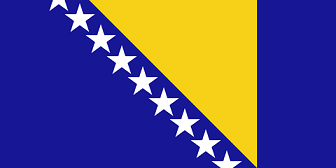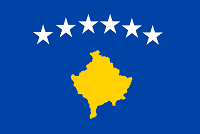
Bosnia Profile:
Population: 3,922,205 (July 2001 est.)
Age structure: 0-14 years: 20.13% (male 405,713; female 383,850) 15-64 years: 70.78% (male 1,422,796; female 1,353,410) 65 years and over: 9.09% (male 150,802; female 205,634) (2001 est.)
Population growth rate: 1.38% (2001 est.)
Birth rate: 12.86 births/1,000 population (2001 est.)
Death rate: 7.99 deaths/1,000 population (2001 est.)
Net migration rate: 8.91 migrant(s)/1,000 population (2001 est.)
Sex ratio: at birth: 1.07 male(s)/female under 15 years: 1.06 male(s)/female 15-64 years: 1.05 male(s)/female 65 years and over: 0.73 male(s)/female total population: 1.02 male(s)/female (2001 est.)
Infant mortality rate: 24.35 deaths/1,000 live births (2001 est.)
Life expectancy at birth: total population: 71.75 years male: 69.04 years female: 74.65 years (2001 est.)
Total fertility rate: 1.71 children born/woman (2001 est.)
HIV/AIDS - adult prevalence rate: 0.04% (1999 est.)
HIV/AIDS - people living with HIV/AIDS: NA
HIV/AIDS - deaths: less than 100 (1999 est.)
Nationality: Bosnian(s)
Ethnic groups: Bosniak 44%, Serb 31%,Croat 17%, Yugoslav 5.5%, other 2.5% (1991)
Religions: Muslim 40%, Orthodox 31%, Roman Catholic 15%, Protestant 4%, other 10%
Language: Bosnian
Literacy: definition: NA total population: NA% male: NA% female: NA%
GDP: purchasing power parity - $6.5 billion (2000 est.)
GDP - real growth rate: 8% (2000 est.)
GDP - per capita: purchasing power parity - $1,700 (2000 est.)
GDP - composition by sector: agriculture: 19% industry: 23% services: 58% (1996 est.)
Population below poverty line: NA%
Household income or consumption by percentage share: lowest 10%: NA% highest 10%: NA%
Inflation rate (consumer prices): 8% (2000 est.)
Labor force: 1.026 million
Labor force - by occupation: agriculture NA%, industry NA%, services NA%
Unemployment rate: 35%-40% (1999 est.)
Budget: revenues: $1.9 billion expenditures: $2.2 billion, including capital expenditures of $NA (1999 est.)
Industries: steel, coal, iron ore, lead, zinc, manganese, bauxite, vehicle assembly, textiles, tobacco products, wooden furniture, tank and aircraft assembly, domestic appliances, oil refining
Industrial production growth rate: 10% (2000 est.)
Electricity - production: 2.585 billion kWh (1999)
Electricity - production by source: fossil fuel: 38.68% hydro: 61.32% nuclear: 0% other: 0% (1999)
Electricity - consumption: 2.684 billion kWh (1999)
Electricity - exports: 150 million kWh (1999)
Agriculture - products: wheat, corn, fruits, vegetables; livestock
Exports: $950 million (f.o.b., 2000 est.)
Exports - commodities: NA
Exports - partners: Croatia, Switzerland, Italy, Germany
Imports: $2.45 billion (f.o.b., 2000 est.)
Imports - commodities: NA
Imports - partners: Croatia, Slovenia, Germany, Italy
Debt - external: $3.4 billion (2000 est.)
Economic aid - recipient: $1 billion (1999 est.)
Currency: Bosnian Mark (BAM)
Currency code: BAM
Exchange rates: Bosnian Mark per US dollar - 2.086 (January 2001), 2.124 (2000), 1.837 (1999), 1.760 (1998), 1.734 (1997), 0.015 (1996)
Fiscal year: calendar year
Bosnia (Bosnian: Bosna) is a country on the Balkan peninsula of Southern Europe with an area of 51,129 square kilometres (19,741 sq mi). The last official census in 1991 recorded 4.4 million people, which was prior to the 1992-1995 Serbian,Croatian and Montenegrin aggressions while an unofficial census in 1996 by UNHCR recorded a postwar population of 3.9 million. Its 2007 residential population is estimated at approximately 4 million.
Formerly one of the six federal units constituting the Socialist Federal Republic of Yugoslavia, Bosnia gained its independence in the 1990s. Bosnia can be described as a federal democratic republic that is transforming its economy into a market-oriented system, and it is a potential candidate for membership in the European Union and NATO.
The country is home to three ethnic "constituent peoples": Bosniaks,Croats and Serbs. Regardless of ethnicity, a citizen of Bosnia is identified in English as a Bosnian. The country is politically decentralized and comprised of two governing entities with Brcko District as a de facto third entity.
Bordered by Croatia to the north, west and south, Serbia to the east, and Montenegro to the south, Bosnia is mostly landlocked, except for 26 kilometres of the Adriatic Sea coastline centered around the town of Ne(h)um. The interior of the country is mountainous in the center and south, hilly in the northwest, and flat in the northeast. The nation's capital and largest city is Sarajevo. Sarajevo was the host site of the 1984 Winter Olympic Games.

